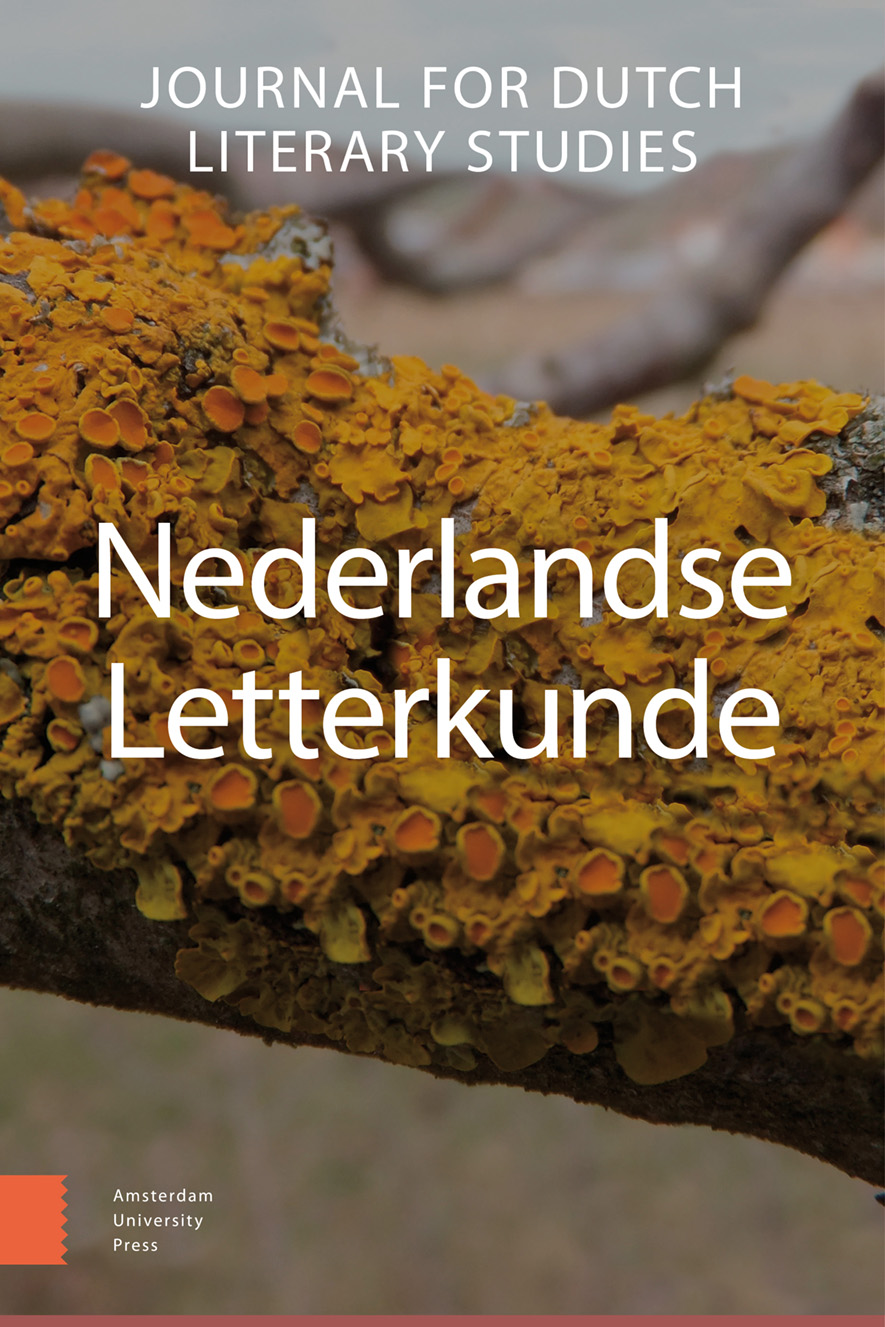- Home
- A-Z Publicaties
- Nederlandse Letterkunde
- Previous Issues
- Volume 23, Issue 1, 2018
Nederlandse Letterkunde - Volume 23, Issue 1, 2018
Volume 23, Issue 1, 2018
-
-
‘Ik kan niet genezen van een kwaal die ik niet ken’
Meer MinderAbstract‘I Cannot Recover from an Illness I Do Not Know’. Depression and Intertextuality in Kikker gaat fietsen (2008) by Maarten van Buuren
The last two decades have witnessed the growth and popularity of autobiographical texts featuring clinical depression in which a first person narrator describes and interprets the experience of mental illness. Existing studies have mainly focused on how these illness narratives can inform clinicians and the broader public about patients’ experiences. This approach, however, hardly acknowledges the constructed, textual, and – therefore – mediated status of the autobiographies. As a consequence, important other functions of the texts have been neglected. By studying the Dutch autobiography Kikker gaat fietsen. Of over het leed dat leven heet (2008) written by Maarten van Buuren, this article demonstrates that an analysis of the narrative and intertextual strategies used to represent depression offers new perspectives on the functions of autobiographical illness narratives. (1) I will show that in Van Buuren’s text descriptions of personal experiences alternate with numerous references to neurobiological terminology and theories. (2) I will demonstrate that the ‘I’ appropriates these insights in order to get a grip on – and give meaning to – his illness experiences, a process by which medical knowledge becomes transformed and evaluated. (3) I will argue that the autobiography, as such, has an important role in the dissemination of knowledge about depression in contemporary culture persistently preoccupied with the understanding and (self) management of health and illness.
-
-
-
Een wandelende anomalie
Meer MinderAuteurs: Gaston Franssen & Stefan van GeelenAbstractA Walking Anomaly: Renate Dorrestein’s Heden ik (1993), ME/CFS, and the indeterminacy of autopathography
Literary memoirs of illness are often invoked as valuable sources of medical and psychological insight. The epistemological value of such ‘autopathographies’, however, remains a matter of dispute in extant research: do these text adequately convey patients’ experiences, or are they literary, artificial constructs, whose value and meaning remain indeterminate? In this contribution, we focus on one such memoir, Heden ik (My Lot Today, 1993) by Renate Dorrestein, describing her struggle with myalgic encephalomyelitis/ chronic fatigue syndrome (ME/CFS). As ME/CFS is generally considered to be an enigmatic illness, an analysis of Heden ik offers the opportunity to map the presupposed values as well as the limitations of autopathography. First, we map the academic debate on the epistemological value of illness narratives. Second, we chart the contours of the discussion on ME/CFS in the early 1990s, whilst demonstrating how the reception of Heden ik highlights the book’s perceived values and limitations. Finally, we offer a ‘double reading’ of Heden ik: a medical reading and an autopathographical reading (acknowledging its literary qualities). In our conclusion, we suggest that the inherent indeterminacy of autopathographical writing might be, in fact, an important quality contributing to a deeper understanding of a chronic, medically unexplained illness such as ME/CFS. Reading autopathographies as literary narratives, we argue, can reveal the rhetorical and cultural dimensions as well as the ambiguities and uncertainties of illness experiences.
-
-
-
Autie-biografisch gelezen
Meer MinderAbstractReading Autie-Biographically: The Field of Tensions between Language, Narrativity and Autism
Within the current disability memoir boom, the popularity of autism narratives makes it almost impossible to keep up with its publication flow. This implies that there is a growing market for those stories, and indeed, several publishing companies are even specialized in these memoirs. However, when autism memoirs – also called ‘autie-biographies’ – are incorporated in research, they often merely function as ‘illustrations’ of an hypothesis, which leads to a reductive understanding and reading practice of those narratives as mere evidence for diagnostic categories. Such a diagnostic mode of reading offers almost no space for asking broader interpretative questions about different relations to language or narrative structure. In the present article, my aim is to study the complex tension between autism, language and narrativity and to propose a hypothesis about the reasons behind the dominance of the diagnostic reading mode within different research disciplines, including literary studies. I do so by focusing on the ubiquity of three recurring issues in the reception of autie-narratives: the window metaphor, the narrative identity thesis, and clinical perspectives. At stake in this research is the continual questioning of what constitutes of a self-narrative, and within this, to ask, who may and can speak, who is and can be considered to be a competent storyteller.
-
-
-
Voor en door gekken
Meer MinderDoor Arnout De CleeneAbstractFor and By Madmen: the Gekkenkrant as a discursive practice
The Gekkenkrant, an anti-psychiatry zine published between 1973 and 1981, takes up an important position in the history of Dutch psychiatry. The Gekkenkrant is to be situated at the intersection of the formal experiments in both Dutch and international avant-garde literature on the one hand and the anti-psychiatric movements from the 1960s and 1970s on the other. The editors and authors of the magazine dedicated themselves to a distinctly activist, pragmatic and situated programme, which resulted in a zine that positioned itself between the aesthetic domain and the world of (anti)psychiatry. This contribution develops a discourse-analytical approach to the Gekkenkrant and approaches the zine as a discursive practice that attempted to renegotiate the relation between (institutional) power and (subjective) knowledge. Special attention is paid to the status of the Gekkenkrant as a form of (anti)discourse and subversive language; the discursive community which produced it (and which it, in its turn, produced); and the relation between its discursive practice and the notion of evenementiality.
-
Most Read This Month


